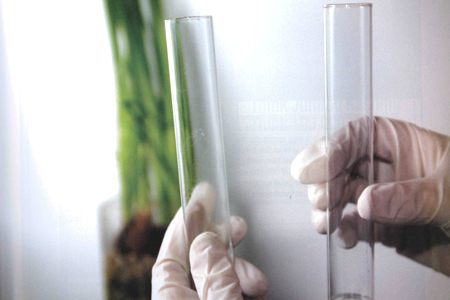
GM FOOD?
Issue 3 Jan / Feb 2004
Words Halima Hussain
Photograph Maeve Tomlinson
‘Eat and drink of that which God has provided and do not act corruptly, making mischief on earth.’ Qur’an (2:60)
The debate about the genetically modified food rages on, but what are real facts in an age of government spin and scaremongering? Halima Hussain discovers the need for greater awareness among muslims.
Since the early days of farming man has modified crops and animals through selective breeding. Modern technology however allows scientists to alter the genes of plants and animals to produce disease resistant crops or animals that grow faster. In theory any living thing with genes can be modified- including us. This means the potential (and therefore risks) for applying this technology to food production is enormous.
The real controversy surrounding this debate comes because there is little evidence of the long-term effects of GM foods on the environment and on humans consuming them. There are also ethical reservations by people who object to the introduction of animal DNA to plants and hold that interference in God’s creation is tantamount to blasphemy. Genetic modification of foods has been justified in the past as being the solution to world hunger, but campaigners against GM, Friends of the Earth, warn “genetic engineering is imprecise and unpredictable.
Most testing is carried out by the very biotech companies that have the most to gain from results that say GM food is safe.” The fear of many organisations speaking out against GM foods is that developing countries will become dependant on GM seeds, which are designed to give a one year crop yield only. GM producers will therefore enjoy constant demand for their product and so can charge without limit.
Genetic modification is not without successes, especially in medicine. Diabetics no longer have to inject insulin derived from pigs but can have a more compatible genetically modified form manufactured from bacteria. This is especially beneficial for observant Muslims and Jews.
In areas outside of medicine genetic modification continues to come under scrutiny. Only recently the Royal Society, the UK’s national academy of science, condemned the carrying out of trials on GM crops saying ministers had failed to act on advice they were given nearly five years ago about GM monitoring. According to Professor Bateson for the Royal Society, “it will not be enough to make best estimates at the start and then assume that everything will turn out as expected.”
The society did not however dismiss the benefits of genetic modification. “GM technology may help to meet the demand for food by an expanding world population, with less impact on the environment.” It is argued that the production of GM crops in Britain will boost economy and encourage biotechnology companies to invest in research and development.
If GM foods pose a threat to the environment and to the family, it is the duty of Muslims to avoid them. But where do we draw the line? If we are happy to eat battery-hen eggs, hormone reared cattle and lamb, is it irrational to object to eating genetically modified tomatoes?
Ameena Hafeez, a young mother talks of the problems facing the Muslim shopper. “When it comes to shopping, I find it a struggle choosing between the organic foods and the cheaper ones. We all want what’s best for our families but in the end it depends on what you can afford.” The Co-op supermarket is Britain’s main farmer and in response to customer objection about GM foods has refused to grow GM crops on its 85,000 acres of land and removed GM products from all Co-op brand food. “We are not against genetically modified organisms in principle, but will not participate in crop trials until we are convinced they will allay current environmental and consumer concerns.
The new ability to transfer genes from one species to another, for example to make a crop disease resistant, or an animal grow faster, is also giving rise to a number of ethical, scientific and environmental concerns.”
According to supermarket shopper and grandfather Faizan Bashir, “Muslims need to address their stance on the environmental issues such as recycling, animal welfare, fair trade, monitoring of halal butchers and problem of GM. They are all interlinked. Muslims have a duty to God to preserve and maintain the earth.” As it is written in the Qur’an: ‘It is he who has made you His agents, inheritors of the earth’. Al-An’am.
What is GM food?
Genetic modification involves changes in the DNA of the plants or animals. Cells, the basic building of life contain DNA, which determine, for example the type of plant, the colour of its petals, and shape of its fruit. Scientists can transfer genes from one animal or plant to another to give it a desired feature.
One common example is to reduce the effects of pests on crops. Maize can be modified so that when attacked by an insect a toxic substance is produced, killing the insect. This occurs by transferring the gene poison from bacteria into maize plant.
As yet there is no clear evidence to prove that GM foods are harmful or beneficial to the environment and the human race. Campaigners against GM crops want clear evidence before GM foods are available to consumers and want large scale experiments stopped.
Scientists claim that the development of GM foods may help to feed the starving populations of the world by providing easy to grow crops in remote parts of the world. The Food Standard Agency say that they are satisfied that testing of GM foods are thorough enough to ensure that “GM foods are as safe as their non-GM counterparts, and pose no additional risk to the consumer.” A label telling you if your food contains GM food ingredients is required by the law in the UK.
Bookmark this |
|
Add to DIGG |
|
Add to del.icio.us |
|
Stumble this |
|
Share on Facebook |
|
Share this |
|
Send to a Friend |
|
Link to this |
|
Printer Friendly |
|
Print in plain text |
|


Comments
0 Comments